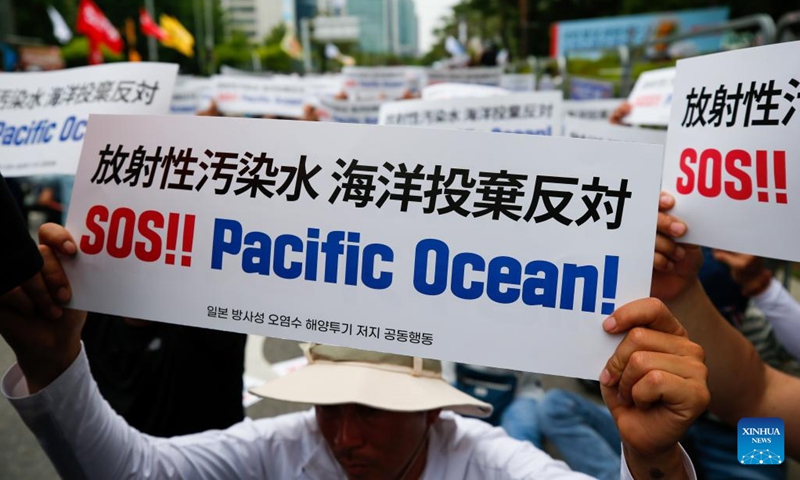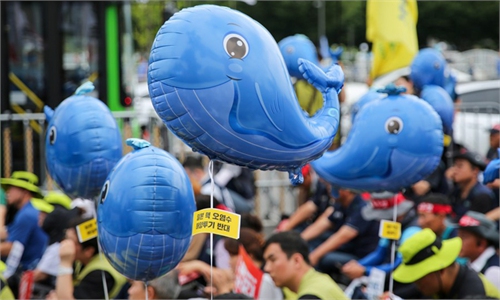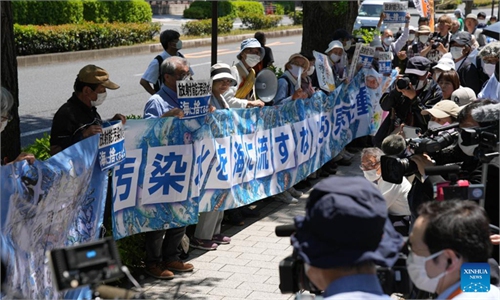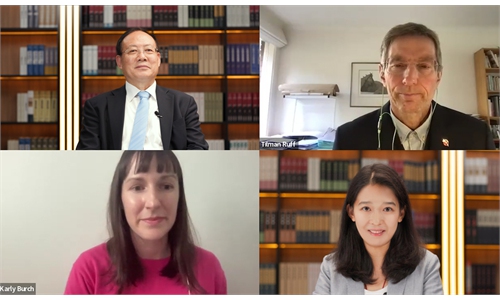As Japan set to dump nuclear-contaminated wastewater in late August, Japanese nuclear expert vows to 'fight it to the end'

People rally to protest against Japan's planned discharge of radioactive wastewater in Seoul, South Korea, June 12, 2023. Thousands of South Korean fishermen gathered on Monday near the parliamentary building in Seoul to clamor against Japan's planned discharge of radioactive wastewater from its crippled Fukushima Daiichi nuclear power plant into the Pacific Ocean. Photo: Xinhua
As mainstream Japanese media revealed that Tokyo could start to dump the nuclear-contaminated wastewater as early as the end this month after the trilateral US-Japan-South Korea summit, observers and the wider public in China, Japan and South Korea reiterated their opposition to the irresponsible move with a Japanese nuclear expert stating that they would continue to protest against the plan.
"We plan to fight it to the end. We are planning to hold a big gathering in front of the prime minister's office on August 18 and we plan to make a petition and submit signatures," Hideyuki Ban, a Japanese nuclear expert and co-director of the Citizens' Nuclear Information Center (CNIC), told the Global Times on Monday.
According to Japanese media outlet Asahi Shimbun, the Japanese government has entered into coordination to determine the wastewater release timing after the summit with the US and South Korea scheduled for August 18. After Prime Minister Fumio Kishida returns from the US, he will hold a ministerial meeting and make a decision over the dumping of contaminated wastewater.
Asahi cited several officials as saying that the dumping is estimated to begin as early as the end of August. The report claimed that Kishida is expected to explain "the safety of the treated water, its scientific basis, and measures to be taken after the release" to the two leaders of the US and South Korea to gain their understanding.
But Ban believes if the contaminated wastewater is dumped in late August, it is the Japanese government that would force the plan without caring for the concerns and opposition from fisheries and the relevant personnel.
In 2015, the Japanese government, the Tokyo Electric Power Company (TEPCO) and Japanese fisheries associations signed an agreement, stating nothing would be done "about the nuclear-contaminated water from Fukushima without the understanding and consent of the relevant people."
If Japanese government dumps the contaminated wastewater into the ocean this August, it means it breaks its promise, which would be "very unacceptable" and "we will protest," Ban stated.
As many parties in Japan and other countries including China oppose the wastewater dumping plan, the Japanese government must be thinking that it will at least get the consent of Seoul and Washington and if the three reach a consensus over the issue during the summit, it is expected to help Tokyo press ahead with its arbitrary plan, Ban pointed out.
Anonymous Japanese officials in the prime minister's office were quoted by Asahi as saying that they believe since some offshore trawling will commence off the coast of Fukushima Prefecture in September, the government hopes to avoid starting the release after the fishing season has begun. For this reason, it is assumed that the dumping will start around the end of August, Asahi reported.
Ban added that considering the sea bathing season ends in late August nationwide, the government should give priority to avoiding the bathing season.
If the contaminated wastewater is dumped into the sea, it will be a blow to the fisheries nationwide. So fishermen are bitter over the discharge, Ban noted.
Chinese observers said that the Kishida government, while failing to explain the plan clearly to its neighboring countries and island nations, is going to visit the US to report the issue to the Biden administration, which once again exposes Tokyo's politicization in dealing with the nuclear-contaminated wastewater.
Da Zhigang, director of the Institute of Northeast Asian Studies at Heilongjiang Provincial Academy of Social Sciences, warned that this potential dumping could inflict damages on the China-Japan relationship.
It is expected that China could push countermeasures against the possible dumping, Da told the Global Times on Monday.
Zheng Sining contributed to this story.




